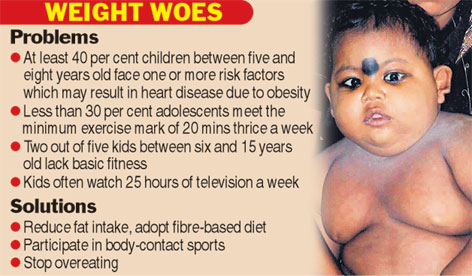 |
Anita Chauhan, 12, a student of Class VII of a reputed Bowbazar school, would study for at least 10 hours a day to catch up with the first girl. But, in spite of her efforts, she could not do so. To make things worse, her parents hauled her up for her failure. A week ago, she attempted suicide by slitting her wrists.
Sanjit Lahiri, 10, wouldn’t sleep and would neglect his studies. Thinking that their son had got into bad company, his busy parents sent him to a boarding school. But things became worse. Sanjit started talking back to his teachers. Last heard, he was thrown out of school.
Both Anita and Sanjit (names changed) are now undergoing anti-depressive therapies with city-based psychiatrists, who feel their parents are to blame for their condition. “Indifferent and busy parents” neglecting their children but expecting “too much” from them are responsible for their wards becoming acutely depressive.
Recent surveys conducted by the Indian Psychiatric Society have revealed that every 40 children out of 100 being tested for depression show “positive results”. Most of them have suicidal tendencies.
According to another independent survey by a city-based organisation, Moon Foundation, dealing only with paediatric depression cases, 30 per cent of 843 students tested “positive”; and more than 250 were victims of acute depression.
The figures may be alarming, but psychiatrists say this situation has not been “achieved” in a day. More than 250 children decided to end their lives between 1999 and 2002. This four-year figure is a 50 per cent rise over the 1995-1998 figure of 160.
“Most parents fail to realise that their child is suffering from depression and simply treat the symptoms, like short temper, lack of appetite and indifference to studies, insomnia or drowsiness, as a passing phase,” Society functionary Ranadip Ghosh Roy said. “Neglecting these symptoms for a long time is leading to disastrous consequences, including traits of violence in children and suicidal tendencies,” he added.
The reason is not very difficult to seek, say his colleagues. “Parents now expect too much from their children,” felt Srikumar Mukherjee, another psychiatrist. “They (the parents) must realise that their children have minds of their own and that they should be given some freedom to choose,” he said.
The pressure of parental expectations, combined with the burden of school curricula, lead to suicidal tendencies and depression. Besides, sports, too, has started to take a toll on the mental health of children. The “Sourav factor and Sachin factor” have turned leisure activities into onerous chores.
Even short spells of illness can lead to depression. “Very often, we find children going through a passing phase of depression when they are ill, in particular when they contract viral infections,” Ghosh Roy said. “In several cases, parents do not give enough time to their children during the recuperative stage, resulting in temporary depression ending up as a permanent condition,” he added.
With more children in need of psychiatric help, the Society will initiate a campaign along with para clubs. Parents will be invited for sessions with psychiatrists on dealing with their children’s problems.










